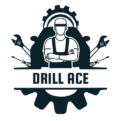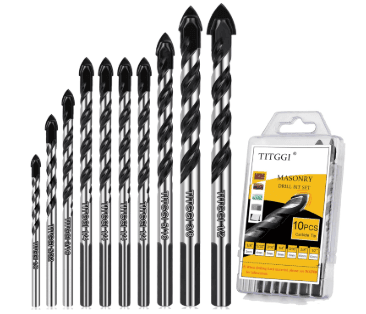Drilling into wood, concrete, or masonry is a common task for DIY enthusiasts, hobbyists, and professional contractors alike. While drills make these tasks easier, they also create a lot of dust and debris that can be harmful if inhaled, messy to clean, and potentially damage surfaces.
This is where drill dust collectors come in. These handy accessories or standalone tools attach to your drill or vacuum system, capturing dust at the source and keeping your workspace clean and safe.
Investing in a high-quality drill dust collector not only improves safety but also increases efficiency by reducing cleanup time.
Whether you are working on small home projects or larger construction sites, understanding the types, features, and benefits of drill dust collectors is crucial. For guidance on selecting the right drill bit for your material, see our Ultimate Drill Bit Guide.
1- Tyrry Drill Dust Collector with Line Laser

The Tyrry 4-in-1 Laser Level Tool with Drill Dust Collector is a versatile and practical solution that makes home improvement projects cleaner, easier, and more precise.
Equipped with a built-in laser level, a dust collection system, an electronic suction cup, and a wall bracket, it is ideal for anyone who hangs pictures, mounts shelves, or carries out small renovation tasks. By combining multiple functions in one tool, it saves time and ensures accuracy while keeping your workspace tidy.
Key Features
- 4-in-1 Multi-Function Design: Combines a line laser, drill dust collector, wall bracket, and electronic suction cup for versatile home use.
- Built-In Drill Dust Collector: Captures dust at the drilling point to keep floors and walls clean.
- Precision Laser Level: Projects a straight alignment line for accurate picture hanging and installations.
- Electronic Vacuum Suction Cup: Sticks securely to smooth surfaces, adding hands-free stability.
- Rechargeable 1800 mAh Battery: Offers cordless convenience for multiple tasks.
Pros
- Effective dust collection improves cleanliness
- Multi-functional tool replaces several separate devices
- Easy to use for beginners and DIY home users
- Laser helps ensure perfectly straight alignment
- Suction cup adds stability for safer drilling
Cons
- Suction cup does not adhere well to textured walls
- Not as strong as professional-grade tools
- Dust collection performance varies by drill type
- Laser visibility can weaken under bright lighting
2- BOSCH HDC250 SDS-Max Hammer Dust Collection Attachment

The Bosch HDC250 SDS-Max Hammer Dust Collection Attachment is a heavy-duty dust-management tool for hammer drills and core bits. It’s designed to reduce mess and airborne dust when drilling into concrete or masonry, making it a smart choice for construction sites, renovation jobs, or serious DIY work.
Key Features – Bosch HDC250 Dust Collector
- Dual-Chamber Dust Collection System: Uses one chamber for the drill bit, and a second to maintain suction against the surface, helping contain dust as you drill.
- Wide Bit Compatibility: Supports large-diameter core bits, from roughly 2¼″ up to 5″, and even up to 6″ if the brush ring is removed, ideal for plumbing, anchor holes, or structural drilling.
- Universal Vacuum Adapter: Compatible with common vacuum hose sizes (1¼″, 1⅜″, or 2″) via adapter, so it works with many shop-vacs and dust extractors.
- Replaceable Brush Ring & Rubber Seal: Helps form a tight seal around the bit and surface, improving dust capture and suction stability.
- Broad Tool Compatibility: Works with SDS-Max hammer drills and comparable large-bit rotary hammers, regardless of brand.
Pros
- Significantly reduces dust and debris when drilling concrete or masonry, improves cleanliness and site safety.
- Supports large core bits for bigger holes, making it versatile for heavy-duty jobs (anchors, plumbing, wiring).
- Flexible vacuum adapter ensures compatibility with many dust extractors.
- Easy to attach and remove, no complicated setup required.
- Cuts down cleanup time and reduces airborne dust exposure, which helps protect health and lungs.
Cons
- Dust collection effectiveness depends heavily on vacuum suction strength and a good seal, weak suction or poor seal reduces performance.
- Adds bulk and weight to drill setup, which can make handling more cumbersome for smaller jobs or tight spaces.
- Brush ring and seal may wear over time and need occasional replacement for optimal performance.
- Fine silica dust may still escape, using a dust mask or respirator is recommended for full protection.
3- Starmix Bohrfixx BF12 Dust-Free Drill Adapter

The Starmix Bohrfixx BF12 is designed for users who want cleaner, safer drilling with minimal dust spread. It attaches to almost any drill and provides direct dust extraction at the point of contact, making it ideal for homeowners, contractors, and DIY users working with concrete, brick, or drywall.
Key Features – Starmix Bohrfixx BF12
- Compatible with drilling diameters up to 14 mm
- Dust extraction directly at the drill entry point
- Works with standard vacuum systems
- Universal fit for nearly all drills
- Lightweight and easy to handle
- Durable plastic construction optimized for long-term use
Pros
- Effectively reduces airborne dust while drilling
- Easy to attach and remove from any drill
- Improves visibility of the drilling point
- Supports clean indoor drilling
Cons
- Not suitable for large diameter bits
- Requires a strong vacuum for best performance
- May not seal perfectly on uneven surfaces
4- Aidelife Rotary Hammer Dust Collection Attachment

The Aidelife Rotary Hammer Dust Collection Attachment is built for users who want efficient dust control when drilling into concrete or masonry. It offers a universal fit for most rotary hammers and helps keep workspaces cleaner during renovation or construction tasks.
Key Features – Aidelife Rotary Hammer Dust Collection Attachment
- Universal design compatible with most rotary hammers
- Strong dust shroud built for high-speed drilling
- Transparent shield for clear visibility
- Quick-attach system for fast setup
- Works with most shop-vac and dust extractor hoses
- Suitable for deep and repetitive drilling
Pros
- Captures dust effectively during heavy-duty drilling
- Universal fit increases tool compatibility
- Transparent cover improves accuracy
- Easy to install and remove
Cons
- Bulkier than standard dust adapters
- Best performance depends on vacuum suction strength
- Not ideal for tight or angled spaces
5- DEWALT DWH050 Drilling Dust Extraction System

The DEWALT DWH050 is designed for professionals and DIY users who want reliable dust extraction during drilling. It helps reduce airborne debris and keeps work surfaces cleaner, especially when working indoors or in finished environments.
Key Features – DEWALT DWH050 Drilling Dust Extraction System
- Combines drilling guide and dust collection in one unit
- Fits most drill brands and bit sizes
- Works with standard vacuum hoses
- Adjustable depth stop for controlled drilling
- Durable construction designed for jobsite use
- Compact size for better handling in tight spaces
Pros
- Keeps drilling dust contained at the source
- Compatible with many drills and vacuums
- Depth adjustment increases precision
- Strong build suitable for frequent use
Cons
- Not ideal for very large drill bits
- Requires firm surface contact to maintain suction
- Some users may find setup slightly technical at first
6- Festool 500483 BHC Drilling Dust Nozzle

The Festool 500483 BHC Drilling Dust Nozzle is designed for clean, precise drilling in both professional and home settings. It attaches easily to Festool dust extractors and captures dust immediately around the drilling point.
Key Features – Festool 500483 BHC Drilling Dust Nozzle
- Designed for use with Festool dust extractors
- Strong suction for dust capture during drilling
- Stable base helps secure the nozzle to surfaces
- Compact design for tight areas
- Suitable for multiple bit sizes
- Made with high-quality Festool-grade materials
Pros
- Excellent dust extraction performance
- Works seamlessly with Festool systems
- Stable surface hold improves drilling accuracy
- Compact and easy to position
Cons
- Best performance only with Festool vacuums
- Higher cost compared to universal attachments
- Not suitable for very large diameter bits
7- DEWALT Shop Vac Dust Collector DXVA00‑1500

The DEWALT Shop Vac Dust Collector DXVA00‑1500 is a practical accessory for DIYers and workshop users who want to keep their workspace clean. It attaches to a wet/dry vacuum and captures dust directly at the source, making drilling, sanding, and other messy tasks much easier.
Key Features – DEWALT Shop Vac Dust Collector DXVA00‑1500
- Funnel-shaped dust intake captures dust efficiently
- Rubber seal maintains suction on walls or surfaces
- Compatible with most wet/dry vacuums and standard hose sizes
- Compact and lightweight for easy handling and storage
- Suitable for drilling, sanding, and other small projects
- Quick and simple attachment to your shop vacuum
Pros
- Reduces airborne dust and keeps work areas clean
- Hands-free operation when suctioned to a surface
- Works with a variety of vacuum hoses and models
- Lightweight and easy to move around
- Minimizes cleanup time after projects
Cons
- Suction effectiveness depends on vacuum power
- Works best on flat surfaces for a proper seal
- Not ideal for heavy-duty debris or very coarse dust
Why You Need a Drill Dust Collector
Dust is more than just a nuisance. Fine particles from wood, drywall, or concrete can irritate your eyes, skin, and lungs. Long-term exposure may lead to respiratory issues, allergies, or other health problems. Dust can also damage your tools, clog machinery, and compromise the finish of your projects.
Drill dust collectors provide a practical solution by capturing dust at the source. Many modern systems use suction, shrouds, or funnels to gather dust as you drill. This not only improves safety but also ensures more precise drilling because you can see the drilling point clearly without being obscured by flying debris. For indoor projects, dust collectors prevent messes on floors, furniture, and carpets, saving time and effort. For metal or hardened steel projects, pairing a dust collector with the right bit is essential, check out our Best Carbide Drill Bits for Hardened Steel guide.
Types of Drill Dust Collectors
Understanding the types of drill dust collectors is essential before choosing one for your projects. Here are the main categories:
1. Universal Drill Dust Attachments
These attachments fit onto most drills and vacuums to collect dust directly from the drilling point. They are lightweight, compact, and convenient for smaller jobs. They are ideal for homeowners or DIY enthusiasts who want a simple solution for indoor drilling.
2. Rotary Hammer Dust Shrouds
Rotary hammer dust shrouds are designed for heavy-duty drilling in concrete or masonry. They usually include a clear protective cover that surrounds the drill bit and a vacuum connection to capture dust. These are popular among contractors and professionals who work with concrete floors, walls, or masonry. If you are considering heavy-duty masonry work, see our Best Hammer Drills for Concrete in 2025 guide to pair your dust collector with the right drill.
3. Drill Guide Dust Collectors
Some dust collectors are integrated into drill guides or depth stops. These allow for precise drilling while simultaneously collecting dust. They are useful for woodworkers and cabinetry experts who need both accuracy and cleanliness.
4. Standalone Vacuum-Based Collectors
These systems are larger and often use a dedicated shop vacuum. They can accommodate various drilling sizes and handle a high volume of dust. These are suitable for workshops, construction sites, or anyone handling repetitive drilling tasks.
Key Features to Look For Drill Dust Collectors
When shopping for the best drill dust collector, certain features can make a significant difference in performance and convenience:
Suction Strength
The suction power determines how much dust is captured during drilling. Stronger suction ensures minimal dust escapes, keeping both the workspace and air cleaner.
Compatibility
Check if the dust collector fits your drill type, bit sizes, and vacuum hoses. Universal attachments are flexible, while some models are designed specifically for rotary hammers or SDS drills.
Durability and Material
Look for durable materials like high-grade plastics or metal components. This ensures longevity, especially when drilling into tough materials like concrete or masonry.
Ease of Installation
A dust collector should be easy to attach, remove, and adjust. Quick installation saves time and allows you to focus on your project rather than setup.
Visibility
Some models include transparent shrouds or dust hoods so you can see the drill point clearly. This improves accuracy and reduces mistakes caused by obscured drilling lines.
Portability
Lightweight and compact collectors are easier to carry and maneuver, especially for tight spaces or overhead drilling tasks.
Pros and Cons of Using Drill Dust Collectors
Pros
- Reduces airborne dust and improves air quality
- Keeps workspaces cleaner and reduces cleanup time
- Protects tools and machinery from dust-related damage
- Increases drilling precision and visibility
- Supports safer indoor and outdoor projects
Cons
- Some models require a strong vacuum to perform effectively
- Not all attachments fit every drill or bit size
- High-end or professional-grade dust collectors can be expensive
- Bulkier models may be harder to maneuver in tight spaces
Tips for Choosing the Right Drill Dust Collector
- Consider Your Drill Type – Ensure the dust collector is compatible with your drill or rotary hammer.
- Assess Your Project Needs – For small indoor projects, lightweight attachments are sufficient. For heavy-duty concrete work, a vacuum-based shroud is preferable.
- Check Dust Capacity – For longer projects, larger dust collection or higher suction systems prevent frequent emptying.
- Prioritize Safety – Look for features like sealed connections and transparent shields to prevent dust from escaping.
- Ease of Use – Select a system that is simple to attach, remove, and clean.
Frequently Asked Questions (FAQs)
Can I use a drill dust collector without a vacuum?
Some small attachments use internal suction chambers or funnels that require minimal vacuum power, but most efficient models rely on a shop vacuum or dust extractor to fully capture debris.
Are drill dust collectors suitable for both indoor and outdoor use?
Yes. For indoor projects, dust collectors prevent mess and reduce airborne particles. Outdoor use also benefits from keeping dust away from your eyes, tools, and surrounding surfaces.
How do I maintain my dust collector?
Regularly empty collected dust, clean filters or hoses, and inspect seals and connections. Avoid using damaged components to maintain suction efficiency and safety.
Will a dust collector fit all drill bit sizes?
It depends on the model. Universal attachments cover a range of bit sizes, while professional shrouds may specify compatible diameters. Always check specifications before purchase.
Do drill dust collectors improve drilling accuracy?
Yes. By capturing dust at the source, these tools keep the drilling area visible and reduce errors caused by debris covering the entry point.
Conclusion
Drill dust collectors are essential tools for anyone who wants to maintain a clean workspace, protect their health, and improve drilling accuracy. By first understanding the different types, key features, and practical usage tips outlined in this guide, you can confidently choose the best dust collector for your specific needs.
Whether you are a DIY enthusiast using universal attachments or a professional contractor relying on heavy-duty shrouds, there is a suitable solution for every project. Ultimately, by investing in the right system, you ensure safer, cleaner, and more efficient drilling for years to come.




